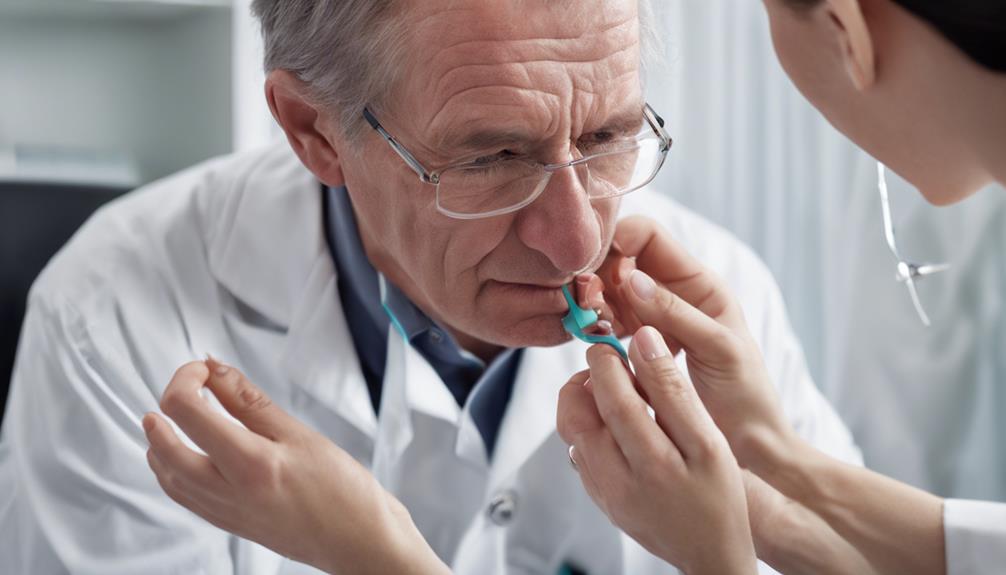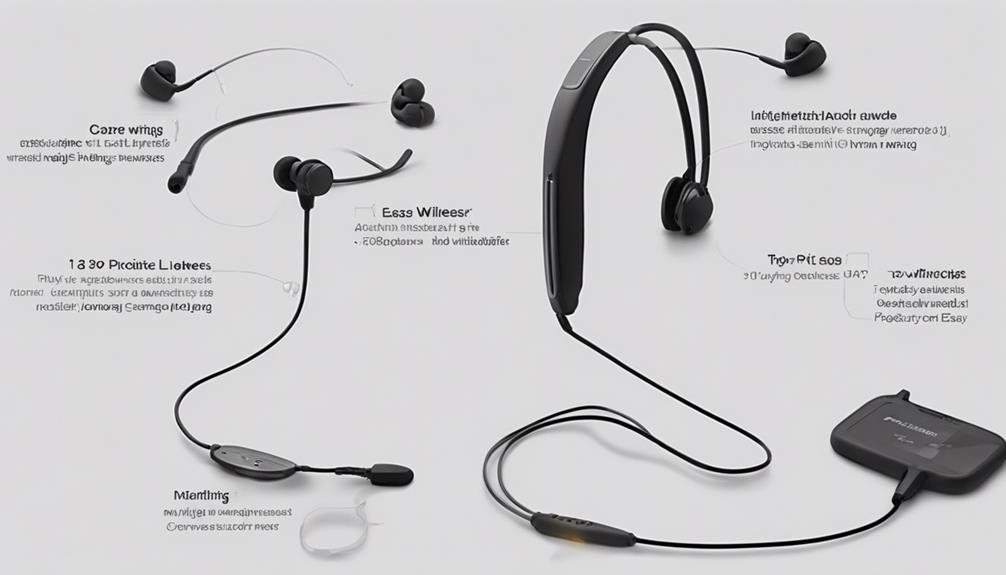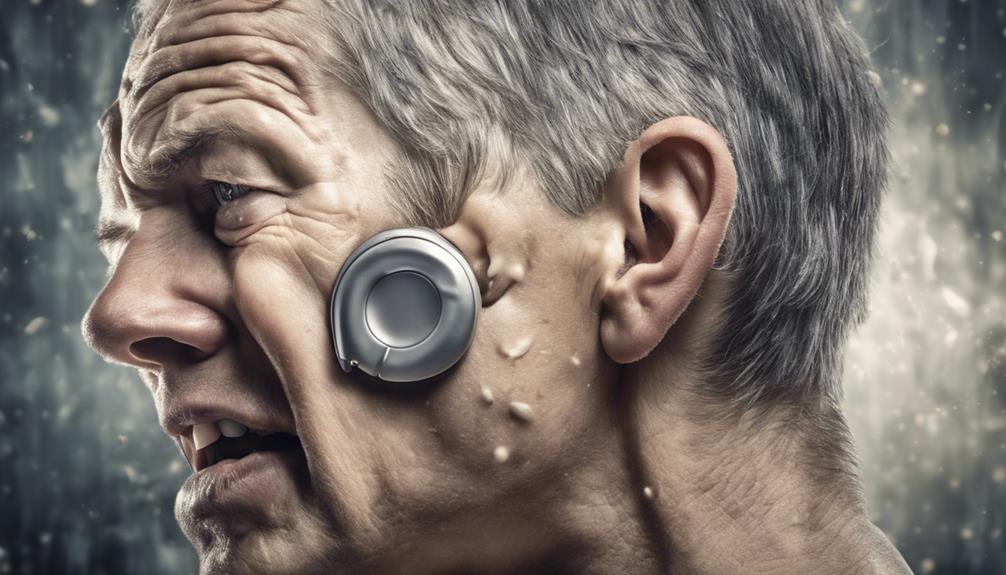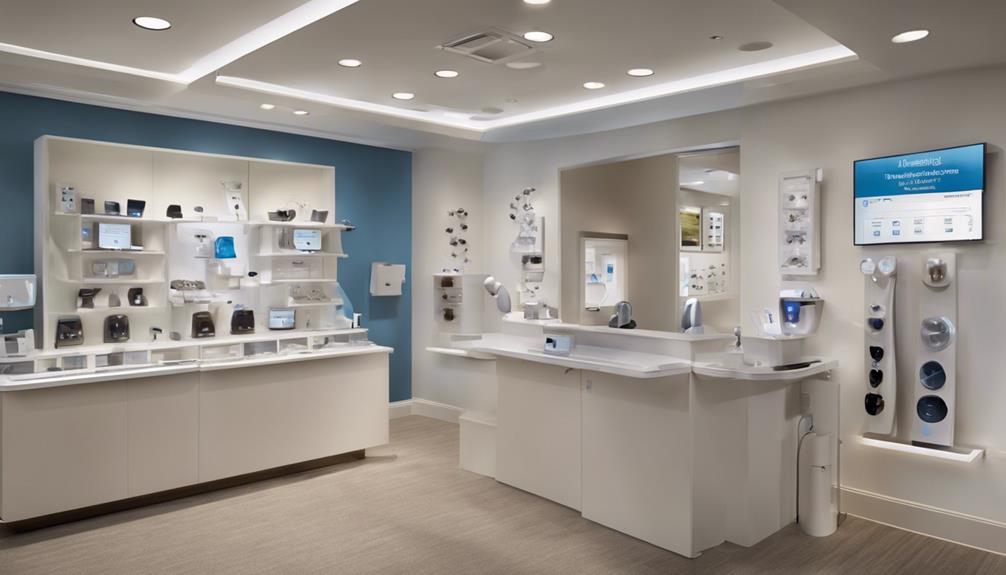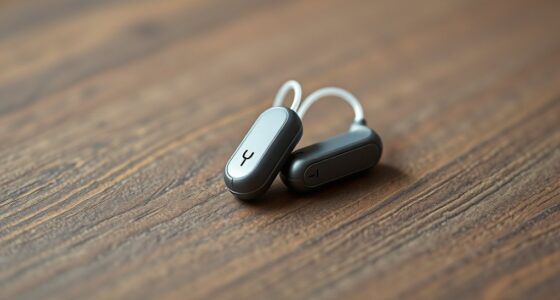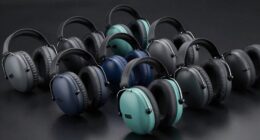Managing ear infections while using hearing aids can be challenging, as it requires balancing sound clarity with ear health.
The symbiotic relationship between the two necessitates a keen understanding of preventative measures to combat infections effectively.
However, the path to optimal management is not without its challenges, prompting us to explore innovative strategies and expert insights that could revolutionize our approach to this critical aspect of hearing aid care.
Key Takeaways
- Prompt antibiotic treatment crucial for ear infection management.
- Regular dome replacements and addressing swelling issues are essential.
- Schedule healthcare visits for proactive infection management.
- Properly fitted aids and moisture control help prevent infections.

8 Pieces Hearing aid Amplifier Cleaning Tools, Earbuds/Headphones Cleaner Brush Kits with case
Multi-functional Hearing Aid CleaningTools: It is suitable for hearing aids, earphones, ear molds, earplugs and other difficult to…
As an affiliate, we earn on qualifying purchases.
As an affiliate, we earn on qualifying purchases.
Common Ear Infection Symptoms
When experiencing an ear infection, common symptoms such as ear pain, fluid drainage, and a feeling of pressure are often present. These discomforts can be exacerbated if one uses hearing aids that aren't properly cleaned. Unclean hearing aids can introduce bacteria into the ear, potentially leading to infections.
Redness and swelling around the ear may suggest the presence of an infection, whether it be an inner ear infection affecting hearing abilities or an outer ear infection causing pain and discomfort.
To avoid ear infections while using hearing aids, it's crucial to maintain proper cleaning habits. Regularly cleaning and disinfecting hearing aids can help prevent the buildup of harmful bacteria that may contribute to ear infections. By ensuring that hearing aids are kept clean and hygienic, individuals can reduce the risk of developing infections that could worsen symptoms like ear pain and fluid drainage. Proper cleaning practices are essential for the overall well-being of both the ears and the device.
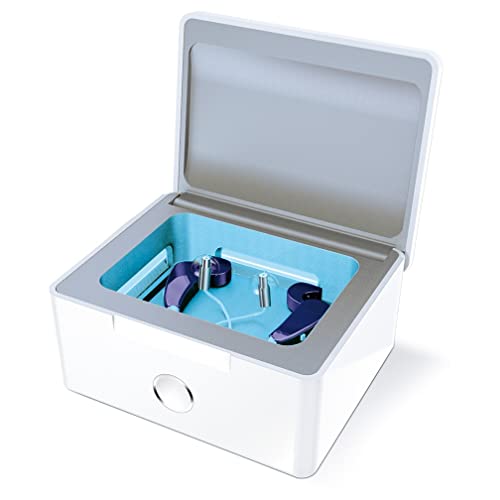
PerfectDry LUX | World's Fastest Hearing Aid Dryer, Dehumidifier Accessory | UV-C Ultraviolet Light Box Kit | Removes Sweat & Moisture from Hearing Aids, Wireless Earbuds, Ear Amplifiers
WORLD'S FASTEST, EASIEST HEARING AID DRYER – Open lid. Close lid. Wait 45 minutes. It's THAT simple! Most…
As an affiliate, we earn on qualifying purchases.
As an affiliate, we earn on qualifying purchases.
Causes of Ear Infections
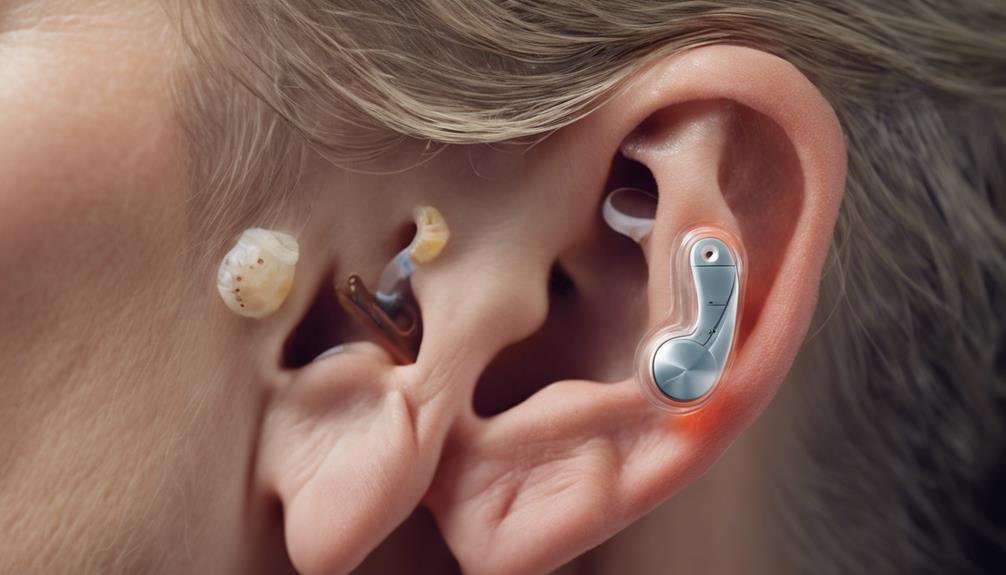
Ear infections can be triggered by various factors, including bacterial or viral influences affecting the middle or outer ear. When it comes to individuals using hearing aids, certain causes can exacerbate the risk of developing ear infections. Moisture trapped by hearing aids creates a conducive environment for bacterial growth, increasing the likelihood of infections. Accumulated debris and wax in hearing aids can irritate the ear canal, further elevating the risk of infection. Improperly fitted hearing aids can cause pressure in the ear, potentially contributing to infections. Additionally, ear infections can lead to temporary or permanent hearing loss, underscoring the importance of proper care when using hearing aids.
| Causes of Ear Infections | Impact on Ear Health | Prevention Tips |
|---|---|---|
| Bacterial or viral influences | Increased infection risk | Regular cleaning of aids |
| Moisture from hearing aids | Bacterial growth | Keep ears dry |
| Debris and wax in aids | Irritation of ear canal | Clean aids regularly |
| Improper fitting of aids | Pressure in the ear | Ensure proper aid fitting |
| Prolonged infection | Potential hearing loss | Seek medical help promptly |

Hearing Aid Domes – Double Layer Closed Type Power Dome for Resound SureFit RIC and Open Fit BTE Hearing Amplifier Ear Tips Accessories with Carry Case (Trial Pack 9pcs)
Compatibility: Our hearing aid domes compatible with ReSound LiNX2, LiNX3D, LiNX Quattro and ENYA behind the ear models…
As an affiliate, we earn on qualifying purchases.
As an affiliate, we earn on qualifying purchases.
Cleaning Techniques for Hearing Aids
To effectively maintain the cleanliness and functionality of hearing aids, it's crucial to employ appropriate cleaning techniques that prevent bacterial buildup and ensure optimal performance.
When cleaning your hearing aids, remove them from your ears and use a soft, dry cloth to wipe off any debris, wax, or moisture. Avoid using water or alcohol as they can damage the devices.
Utilize wax picks and bulb blowers to remove excess wax and moisture in the earpieces. It's essential to keep your ears dry and the hearing aids as free from moisture as possible.
Leaving the battery door open when not in use can help prevent moisture accumulation inside the devices. By following these proper cleaning methods regularly, you can reduce the risk of unclean hearing aids contributing to ear infections.

BOCOKO 2 Pieces Hearing Aid Clip Anti-Lost Lanyard BTE Protector for Adults Seniors and Kids(Black)
HEARING AID PROTECTION – Coming with a firm plastic clip, a silicone lanyard with two eye loops and…
As an affiliate, we earn on qualifying purchases.
As an affiliate, we earn on qualifying purchases.
Tips for Preventing Ear Infections
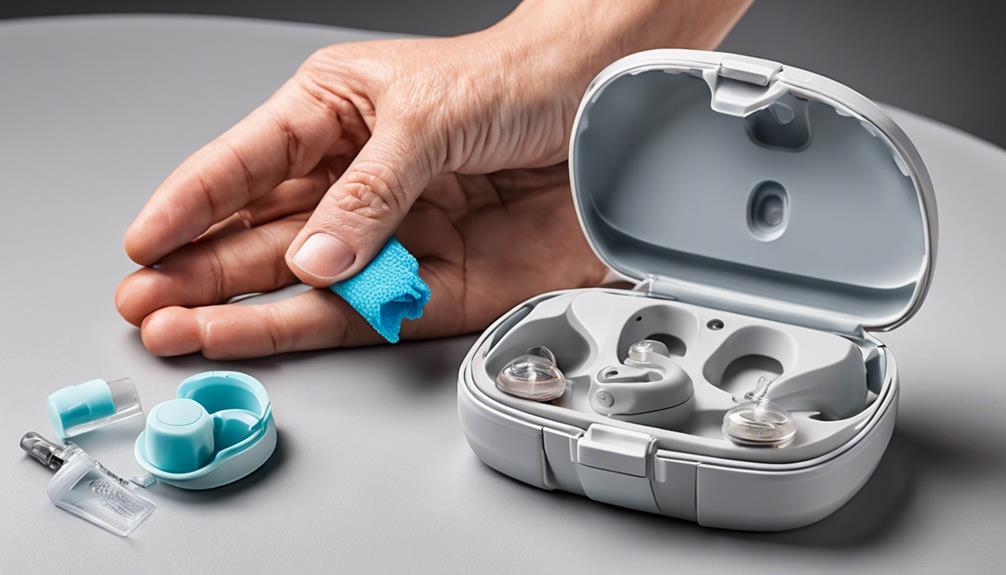
Implementing proper hygiene practices and adopting preventative measures can play a crucial role in minimizing the risk of ear infections while using hearing aids. To prevent ear infections effectively, consider the following tips:
- Regular Cleaning: Ensure to clean your hearing aids regularly to reduce the risk of ear infections caused by debris accumulation.
- Proper Fit: Opt for properly fitted hearing aids to prevent irritation and infections in the ear canal.
- Moisture Control: Avoid moisture buildup in the ear canal as it's crucial for preventing ear infections while wearing hearing aids.
- Establish Routine: Establish a regular cleaning routine using the appropriate tools to significantly decrease the likelihood of ear infections.
Managing Infections With Hearing Aids
Utilizing immediate antibiotic treatment can effectively clear ear infections associated with the use of hearing aids. When wearing hearing aids, infections can make wearing them uncomfortable and less effective. To manage infections with hearing aids, it is crucial to clean your hearing aids regularly and replace domes in a timely manner. Failure to do so can lead to swelling in the ears, affecting the proper fit of the aids. This type of ear infection, known as Otitis Media, can cause discomfort and impact your ability to hear clearly. If an ear infection occurs, it is essential to keep your ears dry and schedule an appointment with a healthcare provider promptly. Neglecting ear infections may result in hearing loss, emphasizing the importance of proactive management. In severe cases, you might need new hearing aids to address recurring infections.
| Infections with Hearing Aids | Management Tips | Importance |
|---|---|---|
| Immediate antibiotic treatment | Regular cleanings | Prevent discomfort |
| Timely dome replacements | Keep ears dry | Maintain hearing effectiveness |
| Address swelling issues | Schedule healthcare visit | Prevent potential hearing loss |
Frequently Asked Questions
How Do You Prevent Ear Infections When Wearing Hearing Aids?
To prevent ear infections when wearing hearing aids, we regularly clean our devices, avoid moisture exposure, and use drying boxes. Professional cleanings every six months are essential for maintenance. Storing aids in a cool, dry place prevents debris buildup.
These practices reduce infection risks and ensure optimal hearing aid performance. By staying proactive with cleaning and maintenance, we prioritize our ear health and overall well-being while benefiting from our hearing aids.
Do People With Hearing Aids Get More Ear Infections?
We don't have data showing that people with hearing aids get more ear infections. However, factors like improper cleaning, fit, or moisture buildup from hearing aids can contribute to ear infections.
Regular professional cleanings every six months and following proper maintenance guidelines can help reduce the risk. Consulting with a hearing care specialist for guidance on maintaining ear health while using hearing aids is advisable to minimize the chances of infections.
Can I Use Ear Drops if I Wear Hearing Aids?
Yes, we can use ear drops while wearing hearing aids, but caution is crucial. Before using ear drops, it's essential to consult a healthcare professional to ensure they're safe for our hearing aids.
Some ear drops may harm hearing aid components, causing malfunctions. Silicone-based drops are generally safer than oil-based or alcohol-based alternatives.
Proper application techniques can help reduce the risk of damage to our hearing aids during treatment.
How Can I Stop My Hearing Aids Hurting My Ears?
We should ensure our hearing aids are properly fitted to prevent discomfort. Keeping our ears clean and dry can also reduce the risk of discomfort.
Avoiding damaged or ill-fitting hearing aids is crucial as they can cause pain or pressure on our ears. Following a regular cleaning routine helps prevent debris buildup that can lead to ear infections.
If persistent pain or discomfort occurs, consulting with our audiologist is essential for proper management.
Conclusion
In conclusion, just as we diligently clean and maintain our hearing aids to prevent ear infections, we must also tend to our inner selves. Like the delicate mechanisms of our hearing aids, our minds and hearts require regular care and attention to avoid negative consequences.
Let's remember that just as a well-maintained hearing aid can bring clarity and joy, a well-nurtured spirit can bring peace and fulfillment.

